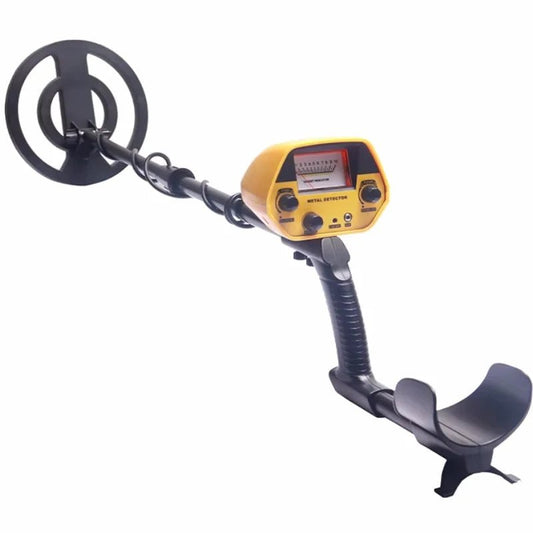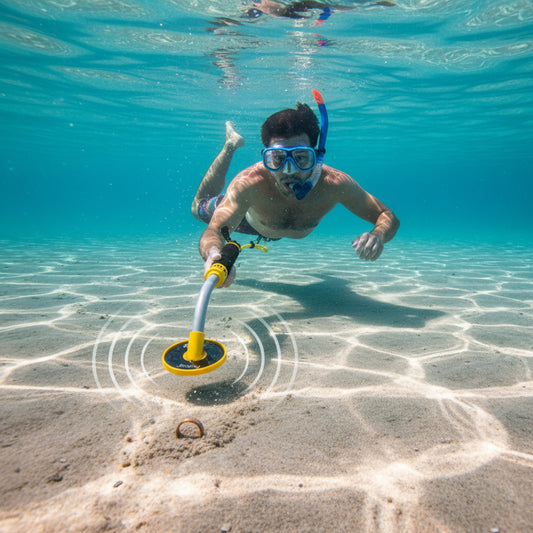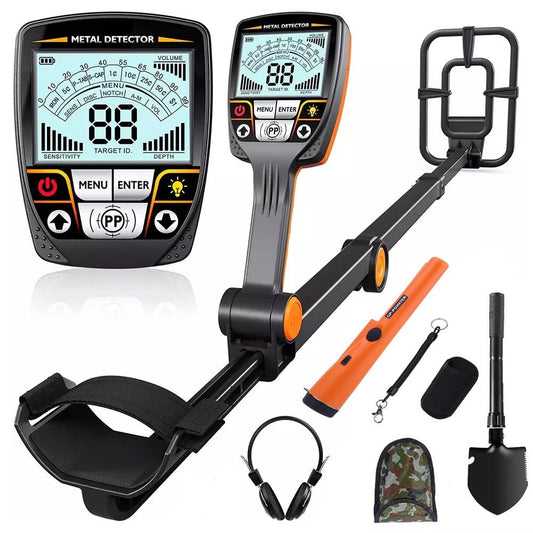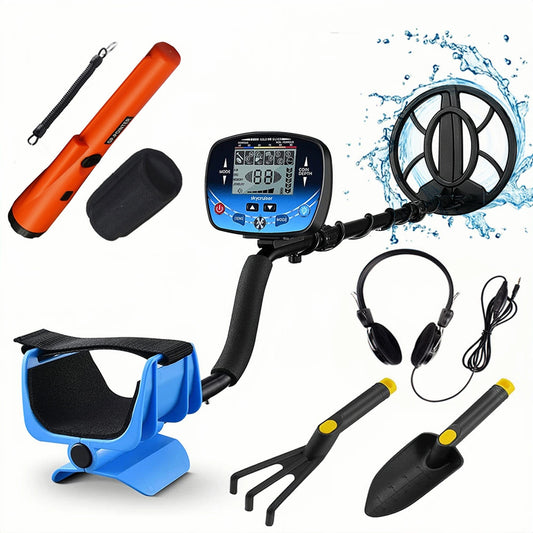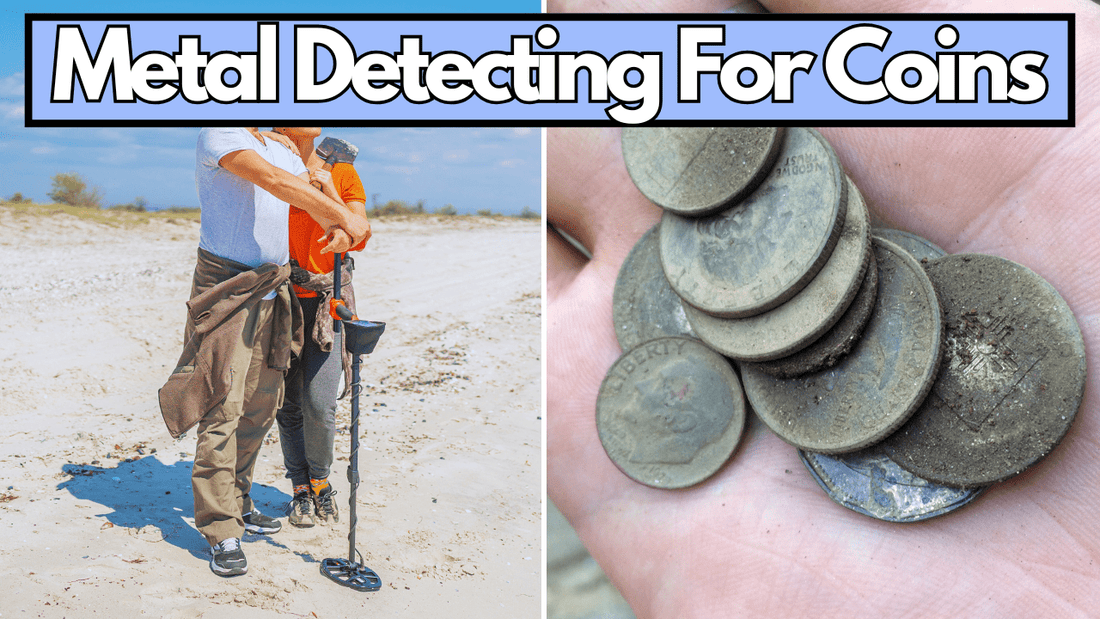
Using a Metal Detector to Find Coins: A Comprehensive Guide
Share
Metal detecting for coins is one of the most rewarding aspects of treasure hunting. Whether you’re searching for modern coins, silver coins, or old coins with historical significance, using a metal detector can help you uncover hidden treasures in parks, beaches, and other promising locations.
This guide will cover everything you need to know about using a metal detector to find coins, including the best places to search, essential techniques, and tips for success.
Why Metal Detecting for Coins is Popular

Metal detecting for coins is a favorite activity among detectorists for several reasons:
-
Accessibility: Coins are relatively easy to find compared to other treasures like gold nuggets or relics.
-
Variety: You can find modern currency, silver coins, or even rare historical coins.
-
Cultural Value: Old coins often provide insights into history and local heritage.
-
Monetary Value: Some coins, especially silver or rare ones, can be worth significant money.
How to Metal Detect for Coins

To successfully detect coins, follow these essential steps:
1. Choose the Right Metal Detector
-
Frequency: Detectors with lower frequencies (e.g., 7 kHz) are better for detecting larger coins, while higher frequencies (e.g., 15 kHz) are ideal for smaller or thinner coins.
-
Discrimination Settings: Use a detector with strong discrimination capabilities to filter out trash like nails or bottle caps.
-
Recommended Models:
-
Garrett AT Pro
-
Fisher F44
-
Minelab Vanquish 540
2. Adjust Your Detector Settings
-
Sensitivity: Increase sensitivity to detect smaller or deeper targets but avoid excessive false signals.
-
Ground Balance: Adjust for mineralized soil or beach conditions to reduce interference.
-
Discrimination: Set your detector to ignore iron and focus on higher conductivity metals like silver and copper.
3. Use Proper Tools
-
Pinpointer: Essential for locating small targets precisely after digging.
-
Digging Tools: Use a trowel or small shovel designed for minimal ground disturbance.
-
Treasure Pouch: Keep your finds organized while separating trash from treasures.
Where to Metal Detect for Coins

The location you choose plays a critical role in your success rate. Here are some of the best places to metal detect for coins:
1. Public Parks
Public parks are excellent places for finding modern coins and occasionally older ones:
-
Why Detect Here? High foot traffic means more lost items like coins and jewelry.
-
Best Spots:
-
Picnic areas
-
Playgrounds
-
Walking paths
-
Tips: Focus on areas with benches or near trees where people often rest.
2. Beaches
Beaches are among the best places to metal detect for silver coins and modern currency:
-
Why Detect Here? Coins are often lost by beachgoers and can be washed ashore by tides.
-
Best Spots:
-
Wet sand areas
-
Near beach entrances
-
Around fire pits or seating areas
-
Tips: Detect during low tide or after storms when new items are exposed.
Learn all you need to know about beach metal detecting.
3. Historical Sites
If you’re wondering where to metal detect for old coins, historical sites are your best bet:
-
Why Detect Here? These areas can yield rare and valuable coins from past eras.
-
Best Spots:
-
Around old buildings or ruins
-
Near colonial settlements
-
Battlefields (with proper permissions)
-
Tips: Research historical maps and documents to identify promising locations.
4. Private Properties
Private land often holds hidden treasures if you have permission from the owner:
-
Why Detect Here? Old homesteads or farms may contain buried treasures like old coins.
-
Best Spots:
-
Around wells or foundations
-
Near barns or storage areas
-
Tips: Always get written permission before detecting on private property.
Where to Metal Detect for Silver Coins

Silver coins are highly sought after due to their value and historical significance. Here’s where you’re most likely to find them:
-
Beaches
-
Look for silver jewelry or older silver currency lost by beachgoers.
-
Focus on wet sand areas where heavier items settle.
-
Old Homesites
-
Explore properties built before the mid-20th century when silver was commonly used in coinage.
-
Parks with Long Histories
-
Older parks in urban areas often yield silver dimes, quarters, and half dollars.
Where is the Best Place to Metal Detect for Coins?
The best place depends on your goals:
-
For modern coins, public parks and beaches with high foot traffic are ideal.
-
For old coins, historical sites and private properties near settlements offer great potential.
-
For silver coins, beaches and older urban parks provide excellent opportunities.
Tips for Successful Coin Hunting

To maximize your chances of finding valuable coins while metal detecting:
-
Research Locations
-
Study maps and historical records to identify promising spots with long histories of human activity.
-
Time Your Hunts
-
Early mornings or late afternoons are less crowded and cooler times to detect.
-
After storms or large events is an excellent time to search beaches or parks.
-
Use the Right Equipment
-
Invest in a high-quality detector with good discrimination settings.
-
Carry essential tools like a pinpointer and digging tools.
-
Practice Responsible Detecting
-
Fill in all holes after digging.
-
Remove trash items you find along with your treasures.
-
Join Local Clubs
-
Connect with other detectorists who can share tips and grant access to private lands.
Common Finds When Metal Detecting for Coins
Metal detecting for coins often yields exciting discoveries such as:
-
Modern Currency
-
Quarters, dimes, nickels, and pennies lost by park visitors or beachgoers.
-
Old Coins
-
Historical finds like wheat pennies, buffalo nickels, or Indian head cents.
-
Silver Coins
-
Valuable dimes (e.g., Mercury dimes), quarters (e.g., Standing Liberty quarters), and half dollars (e.g., Walking Liberty half dollars).
-
Rare Coins
-
Occasionally, you might stumble upon rare collectible coins worth significant money.
Safety Considerations When Coin Hunting
While coin hunting is generally safe, keep these precautions in mind:
-
Be aware of your surroundings in public spaces.
-
Stay hydrated during long sessions outdoors.
-
Avoid detecting during extreme weather conditions like thunderstorms.
-
Always respect private property boundaries and obtain permission when needed.
Conclusion: Mastering the Art of Coin Hunting
Using a metal detector to find coins is an exciting way to combine history, adventure, and treasure hunting into one rewarding hobby. By understanding how to metal detect for coins effectively—choosing the right equipment, targeting the best locations, and practicing responsible techniques—you can maximize your success while enjoying every hunt.
Whether you’re searching beaches for silver coins or exploring historical sites for rare finds, coin hunting offers endless opportunities for discovery. So grab your gear, research your next location, and start uncovering hidden treasures beneath the surface!
Happy hunting!

